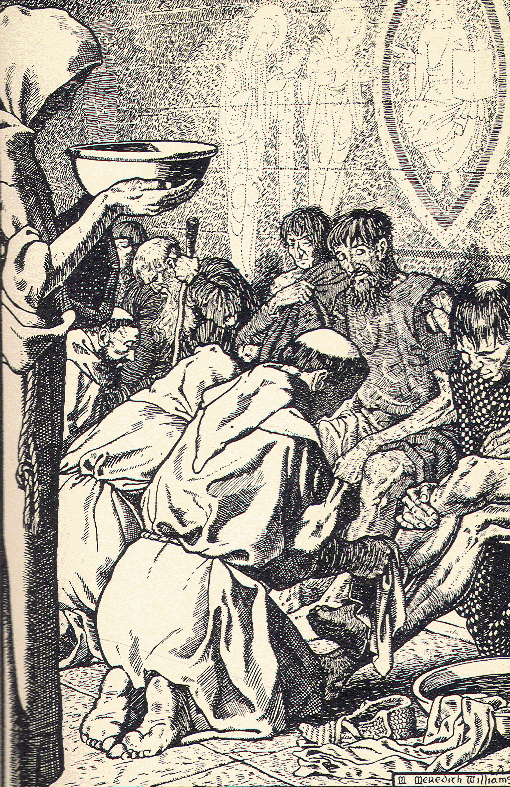Have you ever participated in a Maundy Thursday foot washing? I find the ritual amusing. What amuses me is the awkwardness of most people, the squeamishness about touching others, the discomfort with an act so unfamiliar and so intimate. I’ve observed many people (okay, white people) choosing to pair up with a close family member for the act, apparently to render the whole thing more palatable. It is understandable, of course; none of us relish discomfort. We are so unskilled at this foot-washing business. And most of us don’t even walk miles a day on dusty roads in sandals. Our feet are fairly clean to begin with—not a lot of stinky feet and mucky water to grapple with, just clean white towels and porcelain bowls (at least in my church). Yet the whole point of the ritual is to push us outside of our comfort zones, to suggest the radicalness of what Jesus did by washing his disciples’ feet (John 13:1-17). That his action was profoundly challenging for his disciples is evident in Peter’s initial refusal to let Jesus do it. Jesus goes on to explain to his disciples that he washed their feet to set an example for them. As their leader and teacher, he was laying aside his position and taking last place, which is what we too are to do as his followers. He was giving us a snapshot of how it’s done.
Kneeling and touching a stranger and drying their wet feet with a towel in a symbolic act may be uncomfortable. But it doesn’t come close to the discomfort of what Jesus is really asking of us here. What Jesus is asking is tremendously, scathingly hard. It is about looking at the places in our lives where we are at or near the front of the line, and making the decision to give up our position to another—to move to the end of the line, relinquishing our status. Because we take serious that Jesus was showing us God’s way.
Few people elucidate this central aspect of Christian theology as well as theologian Cristina Cleveland. For anyone with privilege to relinquish or position to share, she is hard listening. Either that, or her message is not being heard. And since she is sharing a part of Jesus’ message that is eminently clear in the Christian scriptures, Jesus’ message is not being heard.
We rather like the ways we stand out and take up positions at the front of the line. Status feels good. Opportunity feels good. Waiting does not. Rejection does not. Being overlooked does not. Those of us with privilege give it up with difficulty because, without a doubt, it goes against our grain. The good news Jesus proclaimed, calling attention to the “reign of God” in which the first will be last and the last will be first, goes against our grain.
If I look at the ways I am at the front of the line as an educated white women raised in a solidly middle-class context that afforded things like private school, private college, financial aid, connections and job opportunities, and if I truly want to see increased opportunity for people of color and for those with less access to education, scholarships, etc. than I have had, that means I’ll forego opportunities for myself in favor of opportunities going to others. For example, I will desire to not get a book deal in favor of the deal going to someone less privileged than I. That is, after all, the meaning of “equity.” I will desire to not get a particular job in favor of the job going to someone nearer to the end of the line than myself. If equity is to emerge in the way Jesus envisioned it, those of us who are “the first,” who occupy privileged positions at the front of the line, will have to give things up. In a big way.
This is what Jesus’ radical act of washing his disciples’ feet is demonstrating. And it is bloody painful. If we cannot admit that it upbraids our innate sensibilities, that it hurts and sets our very teeth on edge, we are likely not telling ourselves the truth or understanding Jesus’ message. We can choose to deny his message in order to protect our privilege, of course, which has been the M.O. of the privileged Christian for millennia. We can say Jesus did not really mean what he said and did, and instead transform the gospel into a capitalist-friendly message of individualistic salvation, altogether enervating and silencing Jesus in the process. It is a well-worn script.
So much of the turmoil we see around the world comes down to the privileged being unwilling to give things up in favor of a world with greater equity, fairer access, more broadly distributed opportunity. This unwillingness is at the heart of the refugee and migration crises all over the western world—the scapegoating and rounding up of the undocumented in efforts to purge our ranks of the “foreign born,” to use a favored expression of Attorney General Jeff Sessions—one of the architects of the Administration’s disastrous “family-separations policy.”
Some call what fuels rising anti-immigrant, anti-refugee efforts “white anxiety.” The term “white anxiety” could be applied to many American churches, unfortunately. As largely white churches grow older, smaller, and less financially sustainable, people say they want to broaden church, to allow the church to change and diversity, to welcome in new faces and generations. But I have witnessed the anxiety that manifests as soon as people realize these efforts require giving things up, relinquishing privilege and power over how things operate, letting oppressed peoples have the positions at the front of the line. It is almost like white Christians would prefer to see churches die out over doing the uncomfortable work of giving up their place in front.
It should therefore not surprise us when they do die out.

